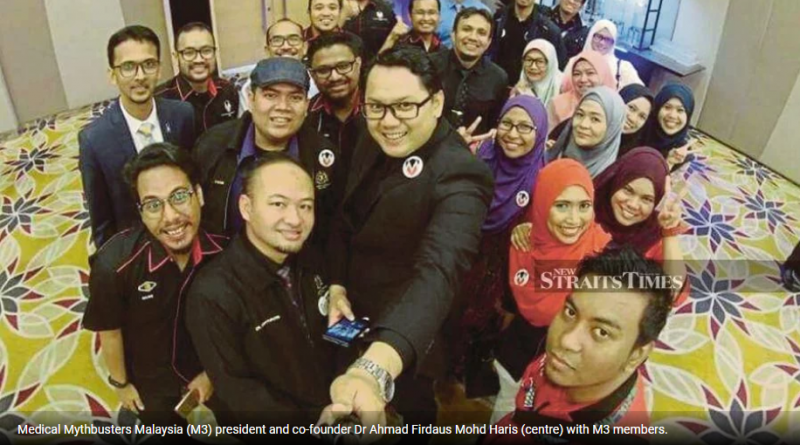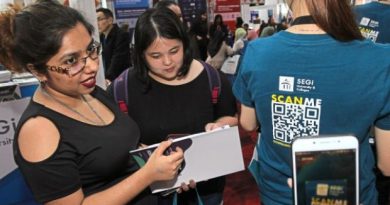Fighting Covid-19 misinformation
KUALA LUMPUR: AS the myriad of misinformation on Covid-19 plagues the world, a group of healthcare workers are hard at work clearing up misconceptions about the outbreak.
They delve into medical facts and details to debunk myths and dismiss fake news circulating on social media involving the outbreak.
Medical Mythbusters Malaysia, a non-governmental organisation (NGO), was set up to help the public understand and digest information through the sharing of credible and verified information.
Medical Mythbusters Malaysia, or M3, was set up in 2016 and formally launched in July the same year, said president and co-founder Dr Ahmad Firdaus Mohd Haris.
“M3 was set up to combat medical misinformation being spread on social media. I am sure everyone must have encountered dubious health claims that sound too good to be true on WhatsApp and Facebook. (M3 is) just like (TV show) Ghostbusters.
“Our goal is to disseminate reliable, concise, evidence-based health and medical information to the general public via social media,” Firdaus told the New Straits Times in an interview recently.
With a pool of 50 professionals specialising in various medical fields, M3 is a platform that health information seekers can turn to on Facebook, Twitter and Instagram, where it has gained a strong presence.
M3 members, who are spread across Malaysia, comprise healthcare workers from various specialties, such as family medicine, public health, paediatrics, ophthalmology, ENT, orthopaedics, anaesthesiology, obstetrics and gynaecology, dermatology, dentistry, psychiatry, psychology, pharmacy, dietetics and paramedics.
In light of the Covid-19 outbreak that has recorded more than 2,000 deaths globally, M3 has been receiving queries on the outbreak from their social media followers, and has seen their numbers hit over 200,000 on Facebook.
“We do receive queries on Covid-19 on social media. Covid-19 presents a new challenge for us as it is a novel virus. Not much is known about the virus even until today.
“There is still much debate on its incubation, how it spreads and guidelines on its treatment. What is said today may not be true and relevant the next day. The information regarding Covid-19 is very dynamic.
“Thus, we have taken a cautious approach. We prefer to echo the official statements of the Health director-general, health minister and World Health Organisation (WHO). Our objective and role on Covid-19 is to ensure that the public acquire the right information from the right source,” said Firdaus.
On a personal capacity, he is part of Health Analytics Asia First Check team, which was formed this month to verify information on Covid-19.
It comprises close to 20 members from China, United States, Hong Kong, Singapore, Australia, Nepal, Pakistan and India who are medical officers, paediatricians, public health advocate, oncologists, endocrinologist, epidemiologists, bio-engineer and psychologists.
“It is a group of fact checkers based in the Asian region. We trawl the Internet for misinformation on Covid-19 and try to gather as much resources and information to verify information being circulated online,” said the Ipoh-based medical doctor.
Firdaus said one of the main problems in the community was the lack of health and medical information that could be easily understood.
“Doctors and healthcare workers love their facts and figures. Furthermore most of the medical jargon is in English, or worse, Latin. Thus, there is a disconnect between the ‘medical language’ and what the layperson can understand.
“The idea behind M3 is to deliver health and medical knowledge in a manner that is easy for the public to understand and is creative to attract their attention. One method that works very well is via story telling.”
M3, he said, usually responded to trending issues regarding health and medicine, which would be followed through with deliberations and discussions on the best ways to respond and create the necessary content.
Firdaus said M3 had special interest in certain topics, such as on vaccination awareness, safe birth and safe delivery, the dangers of tobacco smoke and e-cigarettes, as well as the harms of pseudo-science and bogus health products.
As an NGO, he said, it actively worked with multiple agencies and stakeholders on ways to tackle such topics and engage with more stakeholders to discuss and work together to improve the health of Malaysians.
He hopes to have a physical presence in the society via community projects and engagements and to branch out to conventional media.
M3 is establishing a strong network link with fact-checking teams across the globe.
“As for our followers, we hope that whatever that has been shared on our social media platform can reach their parents and those in kampung. The elders at home and the villagers are the ones most susceptible to health scams and myths. And they are the ones who can be most affected.
“In future, M3 hopes to conduct health awareness and home visits to those without access to credible and reliable information,” said Firdaus.
Source: NST



